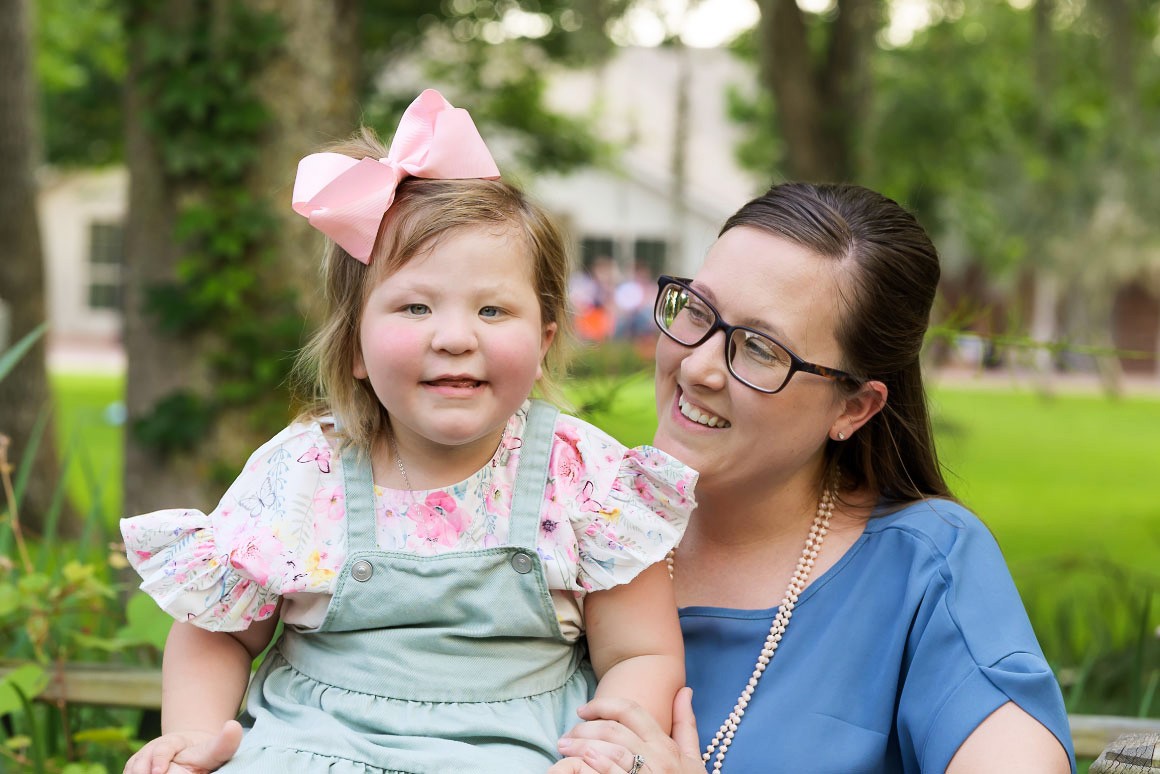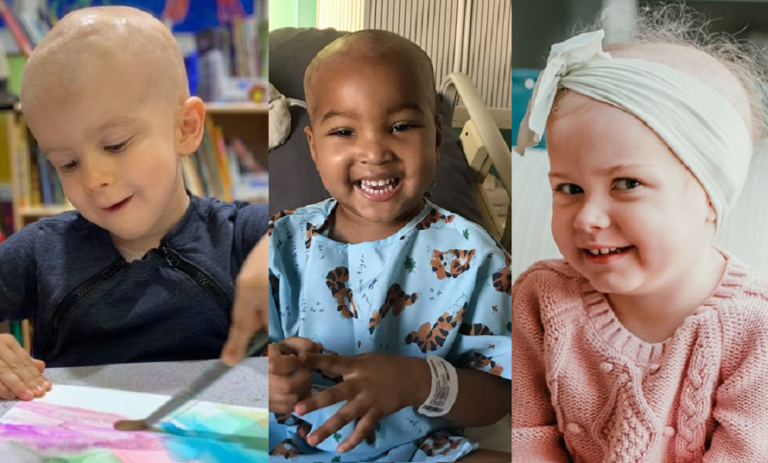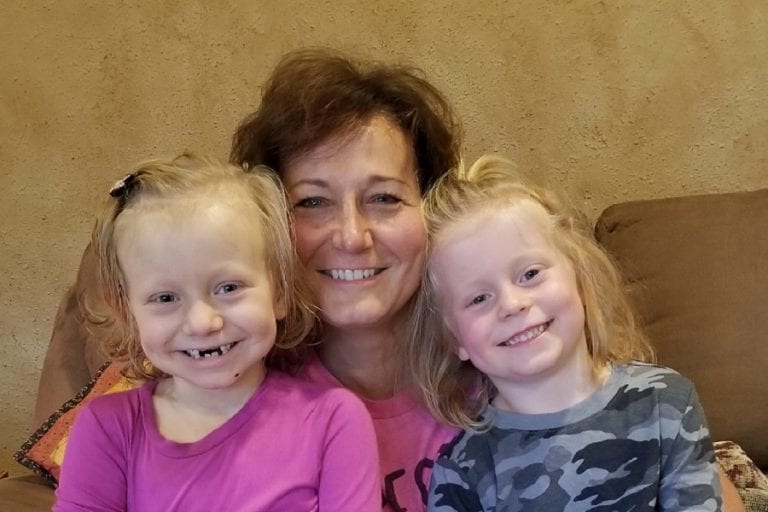On a summer day when she’s feeling well, you can find Kimber pumping her legs on the swings or floating in the pool. She loves spending time with her older sister, Kallie, and she’s generous with her wide, scrunchy smile, even when she’s not feeling her best.
Kimber was born with Koolen-De Vries syndrome, a rare genetic condition that can cause developmental delays, distinctive facial features and many other health concerns. She’s always been on her own path when it comes to developmental milestones, and at 18 months old she began working with speech and occupational therapists to help build skills that don’t come as easily to her. They were the first to notice something was off – Kimber was slowly losing movement of her right side. When her right leg started dragging, Kimber’s mom, Tiffany, had a gut feeling that this was serious – Tiffany and her husband, Kolton, put Kimber in the car and drove to the emergency room. On the way there, a scary thought popped into Tiffany’s head – could this be a brain tumor?
“Sometimes you just know, as a mom,” Tiffany said. “They tried to send us home after a scan that looked normal, and I had to push for them to do more tests - right leg dragging is not normal.” They left that ER with no answers. Because of Tiffany’s advocacy, Kimber was directly admitted to another hospital without being seen.
Tiffany remembers the morning a neurosurgeon came into Kimber’s room after two stressful days of tests. The surgeon told Tiffany that her 2-year-old daughter, sleeping peacefully in the hospital bed, had a tumor in her brain stem.
“He told me, ‘We can’t do surgery, it would be too risky. She’s just going to go to sleep one day and not wake up,’” Tiffany said. “I think he got in trouble for saying that later. I’m sure a lot of us parents have had conversations with doctors who say something they never should have said.”
Thankfully, this wasn’t true – Kimber was then transferred to another hospital and had two brain surgeries that same week. Tiffany pushed for another MRI three weeks after surgery due to fever spikes. Her gut was right once again – the tumor had already grown in that short time. A more aggressive treatment plan finally came together – including 80 weeks (about 1 and a half years) of chemotherapy.
A Big Sister and More Helping Hands
Chemotherapy made Kimber tired, and it also knocked her immune system down, meaning the flu or a common cold was a serious health risk. This meant the whole family had to be careful – and many childhood experiences were on hold for both Kimber and Kallie. Tiffany said it’s been hard to watch how Kimber’s cancer has impacted her older sister, who has had to help in ways that are far beyond her 7 years.
Kimber had a nasogastric (NG) tube, a tube that goes down her nose and into her esophagus to deliver liquid food and some medications. Sometimes the tube would get pulled out, and if Tiffany was the only parent home, she needed help getting the tube back in.
“Kallie, my poor kid, had to help me hold Kimber down so we could get it back in,” Tiffany said. “It was either that, or take Kimber to the emergency room, and we were always worried she’d catch something there. So I would have to talk Kallie through how to keep Kimber still so I could put the tube down her nose. We did it multiple times. That was hard... Kallie shouldn’t have had to do that.”
Tiffany says one of the hardest parts of Kimber’s treatment has been losing her job – so many doctor visits, therapy appointments and not being able to attend daycare due to Kimber being immunocompromised made it impossible for Tiffany to keep working, and the income loss has hit the family hard.
“It was just another hit during a difficult time, but I had to tell myself that Kimber was more important than any job,” Tiffany said.
She says it’s been helpful to share her experiences with a community of childhood cancer families she’s found online – job loss, sibling struggles, and isolation are common problems for childhood cancer families, and it’s been helpful to see stories of people who can relate. Reading stories of other cancer families and connecting about their experiences has made Tiffany feel less alone – and has made her realize just how urgently these kids need more treatment options.
“There are only a few drugs they can use, and if those don’t work, you have to hope there’s a clinical trial,” Tiffany said. “And even the things that do work aren’t enough – you see all these kids being nauseous and sick... they’re missing out on a normal childhood. It shouldn’t be normal to get poked with needles all the time.”
Kimber Moving Forward
Kimber, now 4, is starting a pre-school program for kids with special needs in the fall, and she’s been improving step by step on her own timeline. She can count to 10, and she loves to bob in the pool with her life jacket on. After a bad allergic reaction from one of the chemo medications which ended her at week 60 of her 80-week protocol, Kimber’s family is determined to fit in family trips and adventures whenever they can. Tiffany says they are enjoying every moment and acknowledging this break from chemotherapy as a blessing.
Tiffany says Kimber’s experience has opened her heart to the stories of other kids who are diagnosed with brain tumors. Even though taking on the emotions of other families’ stories is heavy, Tiffany says they’re important to carry - these stories have turned her into an advocate for better options for kids like Kimber.
“When it’s not you, you think, I have to look away, I don’t even want to imagine,” Tiffany said. “But now I want people to know that this is what our cancer kids are having to go through. I’m glad that Kimber has ended up having options after we were told there were none, but this needs to be better. I used to look away, but now I have lived it and understand our children need more options and the funding for a cure.”
We must do better for kids like Kimber.
Cancer treatments for kids like Kimber haven't improved in decades - but we believe we can do better by funding research. Your gift supports researchers searching for better, safer treatments for kids fighting cancer.




